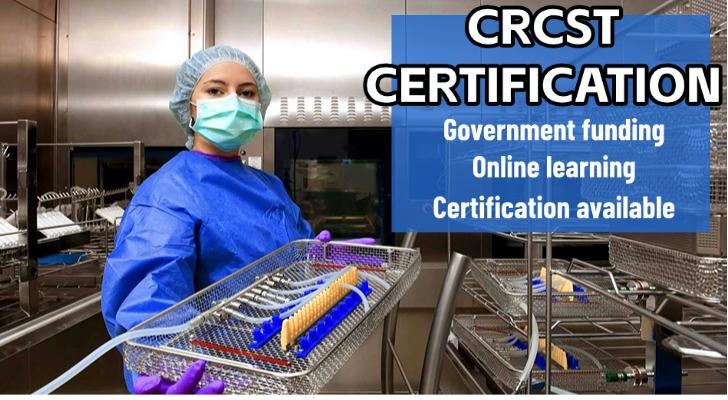Sterile Processing Technician Training: Government funding to obtain CRCST certification to start a medical career
Want to enter the medical field but worried about tuition and financial pressures? Government-funded Sterile Processing Technician training programs open doors for those seeking practical skills and a prestigious certification. This career path offers stability and growth potential, and without direct patient contact, making it an ideal choice for many.
🌟 I. Why Choose a Sterile Processing Technician Course?

Employer Trust: Passing a certified Sterile Processing Technician program will earn you recognition from hospitals, clinics, surgery centers, and other healthcare institutions, enhancing your job competitiveness.
Earn While You Learn: A CSSPT apprenticeship means you'll be paid while you work and train. According to the U.S. Bureau of Labor Statistics, hourly wages for new technicians typically range from $20.95 to $33.42, which can alleviate financial pressures during your initial career.
Official Certification: Completing the certified program qualifies you to take the CRCST exam and earn the Central Service Technician certification, a standard for most healthcare hiring practices.
Flexible Learning: Online or hybrid course options are available, perfect for students who need flexible study schedules and can study from home while balancing work and family responsibilities.
Career Development: Certification allows you to advance your career and increase your income in areas such as medical equipment management, quality control, and technician management.
Financial Aid Options: Many schools offer scholarships, grants, and other assistance to help students alleviate financial burdens.
📚 II. What are some publicly funded sterile processing technician training programs?
Vocational Education Schools and Certifying Agencies Many states include sterile processing training in WIOA funding, and eligible individuals can receive tuition assistance for certificate and diploma programs. Enrollment is typically through local workforce centers or partner educational institutions, such as Herzing University and Keiser University.
Community College Partnership Programs St. Louis Community College has partnered with BJC HealthCare to offer a Central Sterile Processing (CSP) short-term vocational training program, offering students the opportunity to earn while they learn. The program combines blended classroom instruction, hands-on skills labs, and online courses. It lasts 12 weeks and runs Fridays from 9:00 AM to 3:00 PM.[Training costs are covered by the employer.]
Non-profit Agencies and Workforce Training Centers Non-profit organizations partner with state employment agencies to offer sterile processing training courses, focusing on certification exam preparation and helping students enter healthcare careers more quickly.
📈 Future Career Paths and Salaries
Average Annual Salary
The average annual salary for a Sterile Processing Technician is $45,280, but specific salaries vary depending on your experience, location, employer, and other factors.
Career Advancement
After several years of experience, you can advance to:
- Medical Equipment Manager: Responsible for managing the cleaning and sterilization of equipment, tools, and instruments in hospitals and clinics.
- Quality Control Specialist: Oversees sterilization procedures and standards within the hospital to ensure compliance with medical safety regulations.
- Sterile Processing Technician Supervisor: Manages a team of technicians, responsible for training, supervision, and operations.
👩⚕️ III. Real Student Experiences

Kaitlin, 28, originally worked in retail but had always been interested in the healthcare field. She decided to switch careers by taking the online Sterile Processing Technician training course in the St. Louis community, earning while learning. After passing the certification exam, Caitlin successfully landed her first full-time job as a Sterile Processing Technician in a hospital. She excelled in her role and quickly rose through the ranks to become a department supervisor, managing a team and participating in the procurement and training of new technologies. Caitlin's experience demonstrates that Sterile Processing Technicians are not only entry-level positions but also have career advancement potential.
📝 Ⅳ.How to Apply for a Sterile Processing Technician Program?
Confirm Accreditation: Ensure your chosen program is accredited by, for example, the Commission for the Certification of Sterilization and Sterile Technology (CBSPD).
Choose Your Learning Format: Choose from online, in-person, or hybrid courses, offering flexibility based on your needs and availability.
Prepare Materials: Typically, a high school diploma or equivalent is required, along with an application form.
Learn Financial Aid: Explore scholarships, grants, or installment payment options to reduce the cost of tuition.
Submit Your Application: Contact the school's admissions office to submit your application and plan your career path.
✅ Embark on a Stable Healthcare Career
This government-funded, certified sterile processing technician training program offers a reliable entry point into the healthcare industry, with excellent career prospects and opportunities for advancement. Whether you're looking for your first job or transitioning to a new career, now's the perfect time to enter this critical healthcare position in a flexible and affordable way!
